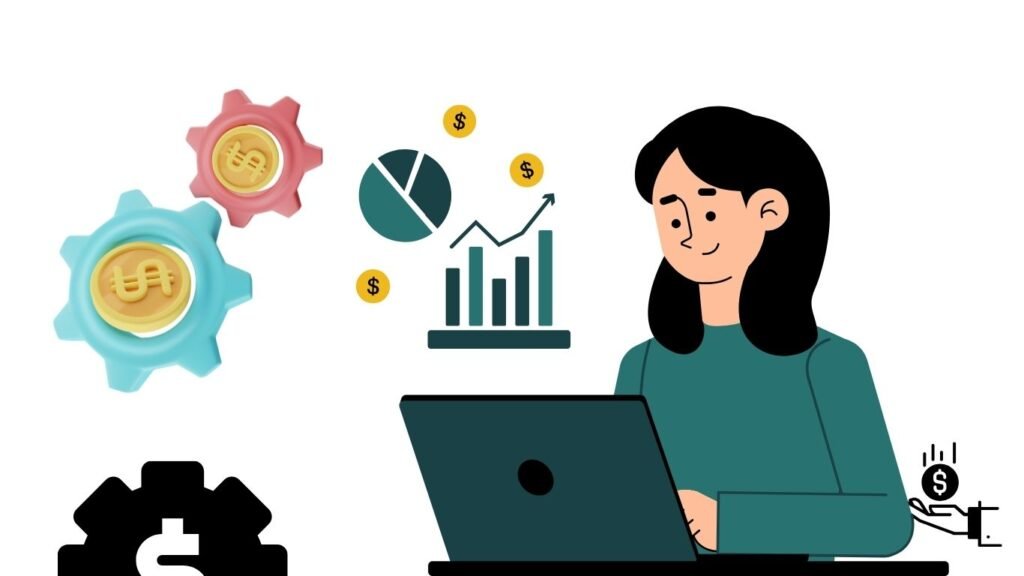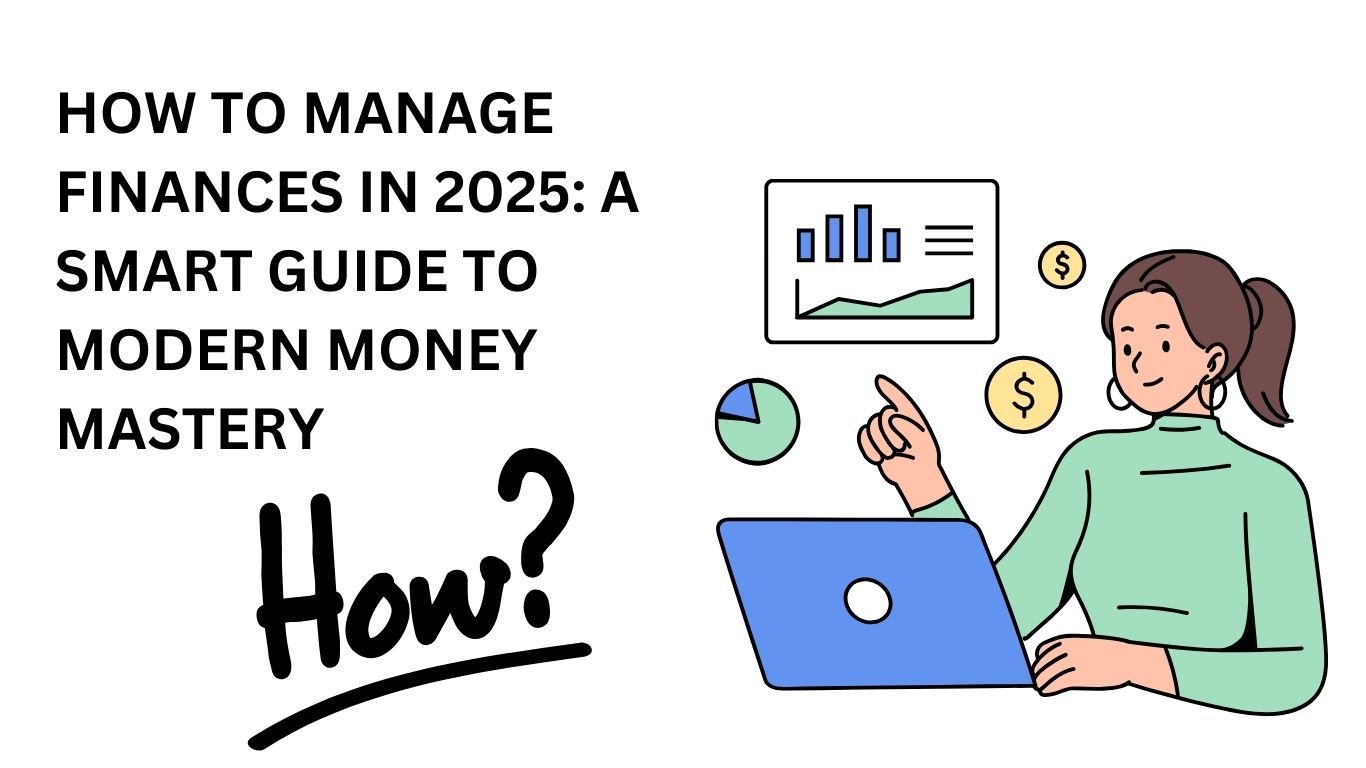Introduction
In 2025, managing your finances isn’t just about balancing a checkbook. It’s about embracing new technology, staying informed, and building smart habits in a fast-paced digital world. With new financial tools, digital currencies, and economic shifts, mastering personal finance requires a fresh perspective. This guide explores how to manage your money in 2025 with a mix of timeless principles and cutting-edge strategies.

1. Understand Your Financial Landscape
The first step in managing your finances in 2025 is awareness. Today’s financial world is more connected and data-driven than ever before.
Track Your Net Worth
Use personal finance dashboards like Mint, YNAB, or AI-driven tools like Copilot to monitor your:
- Income
- Expenses
- Assets (savings, investments, property)
- Liabilities (loans, credit card debt)
Tip: In 2025, many banks and fintech apps automatically calculate and display your net worth daily.
Embrace Open Banking
Open banking lets apps securely access your banking data to help you make better decisions. It’s a game-changer for budgeting and goal-setting.
2. Budget with Precision Using Smart Tools
Traditional budgets are evolving. In 2025, budgeting means creating real-time, adaptive plans.
Use AI-Driven Budgeting Tools
Smart apps analyze your habits and suggest spending adjustments.
- AI tracks your subscriptions and suggests cancellations.
- Real-time alerts notify you when you’re overspending.
- Category auto-tagging saves time.
Recommended Tools:
- Monarch Money
- YNAB (You Need A Budget)
- PocketGuard
Try Zero-Based Budgeting
Assign every dollar a purpose:
- Rent: $1,200
- Savings: $400
- Groceries: $300
- Fun: $150
You don’t leave any money “floating.”
Automate Your Budget
Set up recurring transfers and auto-payments:
- Emergency fund → High-yield savings
- Retirement → Roth IRA or 401(k)
- Subscriptions → Auto-pay to avoid late fees
3. Build an Emergency Fund (Still Essential!)
No matter how high-tech we get, emergencies happen. In 2025, economic uncertainty, climate risks, and job disruptions make emergency savings crucial.
How Much Should You Save?
- Minimum: 3 months of expenses
- Ideal: 6 months or more
Where to Store It:
- High-yield savings accounts
- Money market accounts
- Digital wallets with FDIC-insured savings pods
Pro Tip: Use a separate bank to avoid temptation to dip into it.
4. Tame Your Debt With Strategy
In 2025, managing debt means working smarter, not just harder.
Track Your Debts in One Place
Apps like Tally or Undebt.it centralize your debts and suggest payoff methods.
Use the Snowball or Avalanche Method
- Snowball: Pay off the smallest balance first for motivation.
- Avalanche: Pay off the highest-interest debt first to save money.
Consolidate If Needed
Use 2025’s low-fee debt consolidation platforms or negotiate with lenders for AI-generated payment plans.
Watch for BNPL Pitfalls
Buy Now, Pay Later (BNPL) services are popular but can lead to overspending. Track them like any other debt.
5. Master Credit in the Digital Age
Credit still matters—for loans, renting, and even job opportunities.
Stay Credit-Savvy
- Monitor your credit score with free tools (e.g., Credit Karma, Experian).
- Set auto-pay to never miss a due date.
- Keep utilization under 30% of your credit limit.
New Credit Options in 2025
- Crypto-backed credit cards
- AI-assisted credit scoring models
- Rent-reporting services to build credit without a card
6. Earn More with Multiple Income Streams
A single job isn’t always enough today. Diversify your income with side hustles or passive income.
Best Side Hustles in 2025:
- Remote freelance work (graphic design, writing, consulting)
- Selling digital products or NFTs
- Subscription-based content (e.g., Patreon, Substack)
- Short-term rentals via Airbnb
- Dropshipping and e-commerce
Platforms to Try:
- Fiverr Business
- Upwork AI
- Gumroad
- Etsy AI Designer Tools
Monetize Your Skills
Use platforms that let you teach online, sell knowledge, or offer services.
7. Save and Invest for the Future
You’re not just saving money—you’re making it grow.
2025’s Smart Saving Tips:
- Use micro-saving apps like Acorns to save spare change.
- Set automated goal-based savings (e.g., new car, house).
- Choose high-yield savings accounts that beat inflation.
Invest with Confidence:
- Use robo-advisors like Wealthfront or Betterment.
- Start small with fractional shares on Robinhood or Public.
- Diversify with ETFs and index funds.
- Consider ESG funds (ethical investing).
New in 2025: Some platforms offer AI-generated investment portfolios tailored to your risk level and goals.
Crypto and Digital Assets
If you invest in crypto:
- Stick to major coins (e.g., Bitcoin, Ethereum).
- Use regulated platforms.
- Don’t invest money you can’t afford to lose.
8. Retirement Planning in 2025
It’s never too early to plan. Retirement looks different today—early retirement and digital nomad lifestyles are popular.
Steps to Start:
- Open a Roth IRA or contribute to your employer’s 401(k).
- Take advantage of employer matches—it’s free money.
- Use compound interest calculators to see how small savings grow.
Retirement Apps:
- Empower (formerly Personal Capital)
- Fidelity Retirement Score
- Charles Schwab Retirement Calculator
2025 Bonus: Some apps now use AI to forecast your retirement lifestyle based on spending habits.
9. Insure What Matters
Financial security means protecting your assets.
Types of Insurance to Consider:
- Health insurance (compare plans via ACA or employer)
- Renter’s/Homeowner’s insurance
- Life insurance (term is affordable and essential if you have dependents)
- Disability insurance in case you can’t work
Digital Insurance Providers:
- Lemonade
- Haven Life
- Policygenius
Pro Tip: Review your insurance annually—needs change as you grow.
10. Embrace Financial Automation
Automation is the key to effortless money management in 2025.
Tasks You Can Automate:
- Bill payments
- Savings transfers
- Investment contributions
- Budget tracking
- Tax document collection
Use IFTTT or Zapier to create financial automation flows. Example: “If paycheck received, then transfer 15% to savings.”
11. Stay Educated and Informed
Financial education never stops. The rules evolve, and so should your knowledge.
Follow Finance Blogs and Podcasts:
- The Financial Diet
- Afford Anything
- ChooseFI
- Mr. Money Mustache
Use AI Chatbots for Quick Advice:
Many banks and apps offer smart AI assistants that help you plan, save, and troubleshoot in real time.
12. Tax Planning in 2025
Smart tax planning helps you keep more of your money.
Tips:
- Use digital tax software (e.g., TurboTax AI, H&R Block)
- Maximize deductions (home office, educational expenses)
- Use pre-tax accounts (401(k), HSA, FSA)
- Organize receipts and documents throughout the year
New Feature: Some tax apps now link with your bank to scan transactions and auto-categorize for deductions.
13. Financial Goals and Vision Boards
Goals keep your financial plan alive and exciting.
Set SMART Goals:
- Specific
- Measurable
- Achievable
- Relevant
- Time-bound
Use Digital Vision Boards
Apps like Trello, Canva, or Pinterest help you visualize goals like:
- Owning a home
- Traveling the world
- Becoming debt-free
- Early retirement
14. Build Financial Resilience
Even in 2025, the unexpected happens. A resilient mindset keeps you financially strong.
Build Resilience By:
- Maintaining an emergency fund
- Diversifying income
- Living below your means
- Staying informed
- Having backup plans
Mindset Tip: View money as a tool—not a stressor.

Conclusion
Managing finances in 2025 is both exciting and empowering. With the right tools and habits, you can take control of your money, reduce financial stress, and build the life you want. From AI-driven budgeting to diversified investments, the future of money is smart, connected, and in your hands.
Start now. Automate what you can, learn what you don’t know, and make each financial decision count. Your future self will thank you.
Suggested Outbound Links to Include:
- Budgeting Tools
- Mention tools like Mint or YNAB (You Need A Budget) when discussing budgeting apps.
- Official Government Financial Advice
- Link to Consumer Financial Protection Bureau (CFPB) for budgeting, credit, and saving guides.
- Retirement Planning Resources
- Use Investopedia when explaining 401(k), IRA, or other retirement vehicles.
- Link to Social Security Administration when talking about retirement income planning.
- Investing Platforms
- Debt Management Help
- Link to National Foundation for Credit Counseling (NFCC) if discussing debt repayment strategies.
- Financial News & Market Updates
- Cryptocurrency & Digital Finance Trends
- Refer to CoinDesk when discussing digital currencies or blockchain-based finance.
📌 SEO Best Practices for Linking:
- Use descriptive anchor text (e.g., “top budgeting tools like Mint and YNAB”)
- Ensure external links open in a new tab
- Use nofollow only for affiliate or sponsored links, not educational or official sources

[…] International money markets are more than just a segment of global finance—they are its circulatory system. By enabling the movement of funds across countries and currencies, they ensure that liquidity is available when and where it is needed. They support global trade, monetary policy, and financial stability. Yet, like all powerful systems, they are not without risks. […]